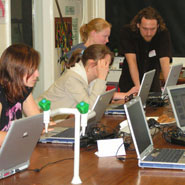The pioneering learning tool has been developed by the Bristol ChemLabS Centre for Excellence in Teaching and Learning at the University of Bristol, and Learning Science Ltd. Based in the University’s SETsquared Business Acceleration Centre, Learning Science Ltd are experts in technology-enhanced innovative learning. Provision of LabSkills is being funded by a joint Royal Society of Chemistry and Pfizer educational project, Discover Chemistry.
University teaching staff from the School of Chemistry worked with Learning Science and teachers from Southampton, Bristol, Leicester and Sheffield to develop the new material.
The goal of LabSkills is to enhance the benefits that can be gained from doing chemistry practicals – but not replace them. Kathy Sykes, Professor of Sciences and Society at the University of Bristol, said: “It’s really important for students to be able to learn by doing and to be able to make mistakes from which they improve their understanding. This revolutionary resource allows students to engage in scientific decision-making and provides a safe environment for them to experiment.”
Former ‘Tomorrow’s World’ presenter Kate Bellingham, newly appointed as the National STEM (Science, Technology, Engineering and Mathematics) Careers Co-ordinator (supporting the government’s 10 year STEM programme) welcomed the resource: “As a scientific experimenter, it can be fun to just ‘try it and see’. With this software, I was able to ‘blow up the lab’ quite safely, learning how to avoid the same mistakes in reality! Practical scientific skills are so useful in many areas, and are vital to the chemists of the future. As a former teacher myself, I know LabSkills will add an extremely valuable new dimension to chemistry by helping to reinforce the importance of health and safety and of scientific rigour, while being informative and engaging.”
Professor Nick Norman, the Chief Executive of Bristol ChemLabS where the software was first developed, said: “We are delighted to receive this funding to help broaden the access and evaluate this tool. The aim of the resource is not to replace practical experimentation in a genuine lab, but to allow students to gain confidence so that they hit the ground running by the time they get to the lab.”
The software is available for schools to buy, but PGCE trainee chemistry teachers are using the resource for free while on school placements. The trainee teachers are also invited to submit proposals on how they would employ this software. The ten who offer the most innovative idea will win a permanent copy of LabSkills for their school.
Dr Paul Hill, Chemistry teacher and head of e-learning at St Mary Redcliffe and Temple School, Bristol, has already used the resource: “LabSkills is a fantastically interactive tool that helps students come into the lab prepared and informed about the practical work they are about to carry out. It helps students make the difficult link between theoretical chemistry and practical activities – a link that is too often missing! I wish this type of tool had been available when I was doing my PGCE!”
Expanding access to LabSkills is part of a joint education project – Discover Chemistry – between the Royal Society of Chemistry and Pfizer Limited. This aims to encourage the most capable students into chemistry, and ensure that they are trained with the correct skills. Pfizer are providing up to £1 million over a three-to-five year period to help support initiatives such as this virtual lab programme.
Dr Tony Wood, Vice President and Worldwide Head of Medicinal Chemistry, Pfizer Global R&D, explains the importance of developing such a resource: “In research-based companies such as Pfizer, there is a growing need for scientists to have strong problem-solving and experimental capabilities. This tool could revolutionise the way practical chemistry is approached in schools and help to nurture graduates who are better equipped to meet the future needs of industry.”
In a study by the Association of British Pharmaceutical Industry, 87 per cent of pharmaceutical companies asked, indicated that a skills gap in practical competence is a concern or major concern to them. The recent Ofsted ‘Success in Science’ report identified that schools that focus clearly on how science works – the practical and investigational aspects – are more successful at teaching the subject. Dr Wood continued: “Positive experiences in practical chemistry at school are key in influencing the paths of many would-be scientists. This is an opportunity that we must harness.”
All teachers have the opportunity to evaluate the resource. Teachers and students can find out more and register interest with RSC on the website. Anyone can sample the learning tool or watch a video of the tool on the LabSkills website.

